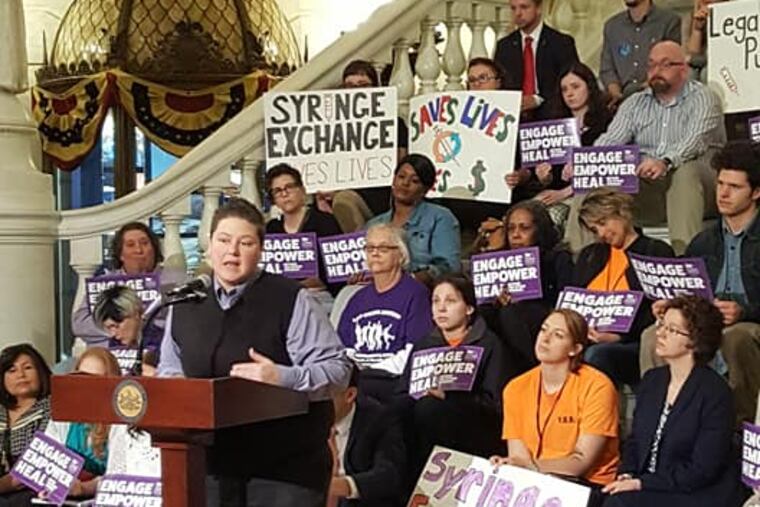Blaming pharma alone for opioid crisis is shortsighted | Opinion
People addicted to opioids are not morally superior to people with other addictions.

This month, City Council failed to pass a bill to limit the activities of pharmaceutical reps in Philadelphia. It is laudable that Council members Cindy Bass and Bill Greenlee introduced legislation to counter the opioid-related overdose crisis, and it’s disappointing this legislation didn’t pass. But future attempts to stem this crisis must move beyond blaming pharmaceutical companies.
Most of us are familiar with the popular tale of the opioid epidemic, spread by media outlets and public health campaigns — including a video from the Philadelphia Department of Public Health spotlighting people who became addicted following medical prescriptions. This story goes something like: “Little Johnny was a great kid, star athlete, and never touched a drug in his life — but after he was prescribed opioids for an injury and took them exactly as prescribed, he got hooked, leading to a downward spiral into heroin addiction.”
This narrative paints big bad pharma and irresponsible doctors as the villains behind addiction, making Little Johnnys the unwitting victims. People who use opioids are then seen as deserving of compassionate responses not extended to other drug users, who aren’t viewed as having been manipulated by medicine.
» READ MORE: Is City Council addicted to Big Pharma? | Editorial
It’s true that pharmaceutical companies engaged in deceptive marketing practices and should be held accountable. It’s also true that doctors liberally prescribed opioids, flooding the market. Yet we can’t simply blame pharma and docs for opioid-related deaths and think that will solve anything.
That’s in large part because the story of Little Johnny, while true for some, isn’t true for most. A survey from the Substances and Mental Health Services Administration found that between 2013 and 2014, most people who misused opioids got them from a friend or dealer — not their doctor.
I also know the truth firsthand. I am a person in recovery from opioid use disorder.
I could easily start my addiction story with having been prescribed opioids for an injury. I hurt my knee playing softball for Northeast High School in 1999, and I was prescribed opioids after surgery.
But starting my story there wouldn’t be the full truth. Long before I touched a prescription opioid, I used other drugs. I also lived with mental health concerns, trauma, and a family history that made me a prime candidate for addiction.
When I first took prescription opioids, purchased off the street and well before my knee surgery, I knew exactly what I was doing. I took them to get high, to numb my psychological pain. I did not know I would become addicted. Like most people, I thought addiction would never happen to me. But I wasn’t duped by pharma. My use of prescription opioids was no different than somebody using crack cocaine, alcohol, PCP, methamphetamine, or other drugs to numb or escape, and I’m not alone.
If we are to get anywhere on opioid and other drug crises — including atoning for the harms inflicted on people of color and poor people by the War on Drugs — we must tell the truth. People addicted to opioids are not morally superior to people with other addictions. Users of all drugs deserve adequate resources and compassion to address addiction.
When city leaders focus on just opioids and the “accidental addiction” narrative, they will likely target only small pieces of what fuels opioid addiction — not the complex factors that cause all addictions. If new policies or resources only benefit people who use opioids and not users of other drugs, city leaders will have grossly missed the mark.
If City Council seeks to truly address Philadelphia’s addiction crises, it has to look beyond pharma to other interventions, such as increasing access to harm-reduction services for all drug users and improving wellness and recovery support in our communities. Regardless of how people come to struggle with addiction or through which drug, all are worthy of compassionate, smart responses.
Brooke M. Feldman is a person in recovery and social worker who, after juvenile justice involvement and receiving services in Philadelphia’s publicly funded behavioral health system, went on to work in that system and obtained a master’s from the University of Pennsylvania’s School of Social Policy and Practice.